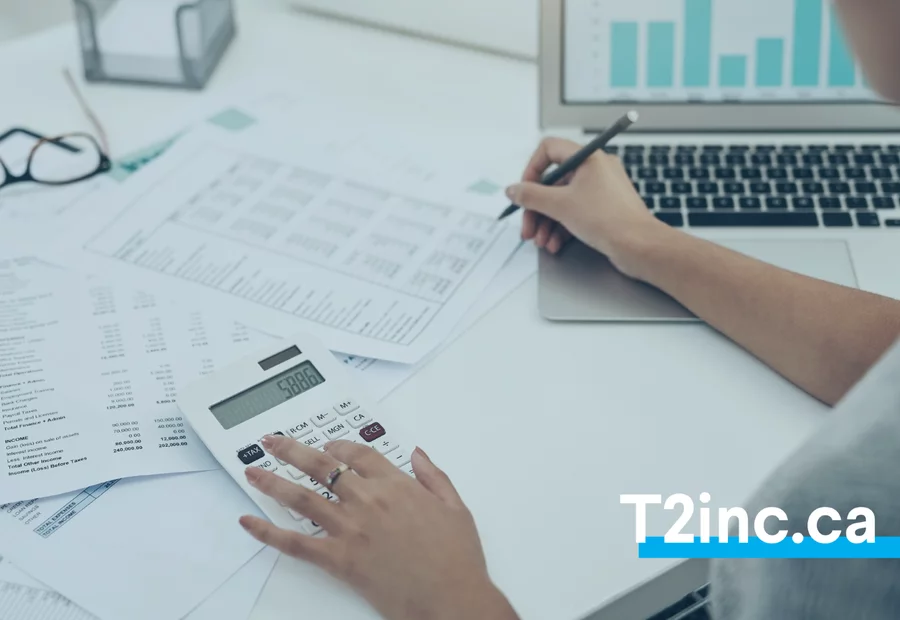How to calculate your business taxes?

How do I calculate my business taxes? This question is often asked by our new clients, and it’s a valid concern. Estimating the taxes owed to the authorities allows you to determine the cash flow available at the end of the tax year. With this knowledge, you can better manage your company's finances, plan future investments, or maximize profits for shareholders.
In this article, our accountants will guide you through the steps to calculate your corporate income tax, helping you manage your tax situation effectively and optimize your obligations for the 2024 tax year.
How is corporate income tax calculated?
The calculation of corporate income tax is based on your taxable income, which is determined by subtracting tax deductions and eligible expenses from your total income. This amount is then subject to Canada's applicable tax rates, which vary depending on federal and provincial tax brackets, as well as the type of business.
For example, small businesses, including Canadian-controlled private corporations (CCPCs), can benefit from the Small Business Deduction (SBD), which lowers their tax rate.
Steps to calculate corporate income tax
To accurately calculate your taxes, it’s important to follow a structured process. This approach helps you estimate your tax liability, reduce taxable income, and optimize your company’s tax management.
Please note that the following steps provided are primarily applicable to CCPCs, which benefit from specific federal and provincial tax rates. If you are self-employed or operate as a general partnership (S.E.N.C.), your income is taxed at individual tax rates, not under corporate tax mechanisms.
Determine your company's taxable income
To calculate your taxes, start by determining your taxable income, which forms the foundation of your tax return calculation. Follow these steps:
- List all sources of income generated by your business, whether from the sale of products, service provision, or other types of income, such as grants or commissions.
- Subtract eligible expenses directly related to running the business, such as transportation, electricity, advertising, and payroll tax deductions.
- Include specific items like capital gains or investment income.
Specific points to consider
- Taxable Capital Gains: If your company sells assets (such as land or equipment), a portion of the gain realized must be included in taxable income. As of June 2024, the capital gains inclusion rate will increase from 50% to 66.67%.
- Non-recurring income: This exceptional income, such as grants, compensation or bonuses, must also be included in the calculation of taxable income.
- Income from the primary or manufacturing sectors: these sectors may qualify for special deductions or tax rates. For example, in Quebec, an additional reduction may apply to manufacturing or primary businesses that meet certain conditions.
Calculate using current tax rates
Canadian corporations, including Canadian-controlled private corporations (CCPCs), are subject to a combination of federal and provincial tax rates. These rates vary by jurisdiction, type of business and taxable income.
At the federal level, small businesses are eligible for a reduced tax rate designed to encourage their growth and competitiveness. This Small Business Deduction (SBD) generally applies to CCPCs with taxable income of less than $500,000. At the federal level, this reduced rate is set at 9%, well below the general tax rate of 15%. Some provinces, such as Quebec, offer additional incentives, notably through the Quebec small business deduction (SBD).
In addition to the federal rates, each province applies its own rates, sometimes with special benefits for sectors such as manufacturing and processing. Here’s an overview of the combined rates for 2024:
| Province or territory | Reduced rate | Higher rate (M&P) | Higher rates (non M&P) |
|---|---|---|---|
| Alberta | 2% | - | 8% |
| British Columbia | 2% | - | 12% |
| Manitoba | None | - | 12% |
| New-Brunswick | 2,5% | - | 14% |
| Newfoundland-and-Labrador | 3% | - | 15% |
| Northwest Territories | 2% | - | 11,5% |
| Nova Scotia | 2,5% | - | 14% |
| Nunavut | 3% | - | 12% |
| Ontario | 3,2% |
| 11,5% |
| Prince Edward Island | 1% | - | 16% |
| Quebec | 3,2% | - | 11,5% |
| Saskatchewan | 1% (until June 30, 2024) | 10% | 12% |
| Yukon | None | 2,5% | 12% |
* Note: The rates shown are those in effect for 2024. For Saskatchewan, the reduced rate is 1% until June 30, 2024 and will increase to 2% as of July 1, 2024.
Application of eligible tax credits and deductions
Federal tax credits and deductions play an important role in reducing your tax burden. They directly or indirectly reduce the amount of tax you owe.
That's why it's important to find out if your business qualifies for any of these programs. Here are some common examples:
Eligible tax deductions:
- Home office expenses.
- Company car mileage.
- Tax preparation or bookkeeping fees.
- Office supplies and equipment.
- Advertising and marketing expenses.
- Utilities needed to operate the business.
Available federal tax credits:
- Scientific Research and Experimental Development (SR&ED) credit.
- Investment tax credit.
- Credits for green initiatives, depending on eligibility.
- Etc.
Note: Some provinces also offer specific credits, such as the Innovation Credit in Quebec or the Rural Credit in Ontario. Depending on your company's location, it's advisable to check the benefits offered by the provincial government to which you are affiliated.
Use software or consult a professional
Managing your tax situation can be complex, especially with multiple tax brackets, credits, and deductions. A reliable income tax calculator or tax preparation software automates tax computation, identifies applicable federal and provincial tax rates, and includes necessary forms like T2 and CO-17. For self-employed individuals, personal tax preparation tools can assist with individual returns.
However, for streamlined, personalized management, there's no substitute for the expertise of a tax professional. This professional goes far beyond the capabilities of a software package: He or she reviews your tax situation in detail, develops customized strategies to maximize your savings, and ensures that all deductions and credits are correctly applied. By combining powerful tax software with expert guidance, you get a complete and effective solution for managing your tax obligations with peace of mind and confidence.
Contact T2inc.ca to simplify your income tax return
At T2inc.ca, we streamline tax preparation for businesses of all sizes. Whether you're a small business or a CCPC, our professionals can help you optimize your corporate tax return and plan for the future.
Contact us today to learn more about our T2 tax return preparation and filing services.
Contact our experts
Have a question? Need help? Fill out our online form to get help from our experts.
Contact usNeed more help?
Contact us by filling out our form
Are you interested in our services, but would like more information before taking the plunge? Contact us today and one of our tax accountants will be in touch to help you.
At T2inc.ca, we're committed to helping business owners manage their company's tax affairs so they can grow their business.



